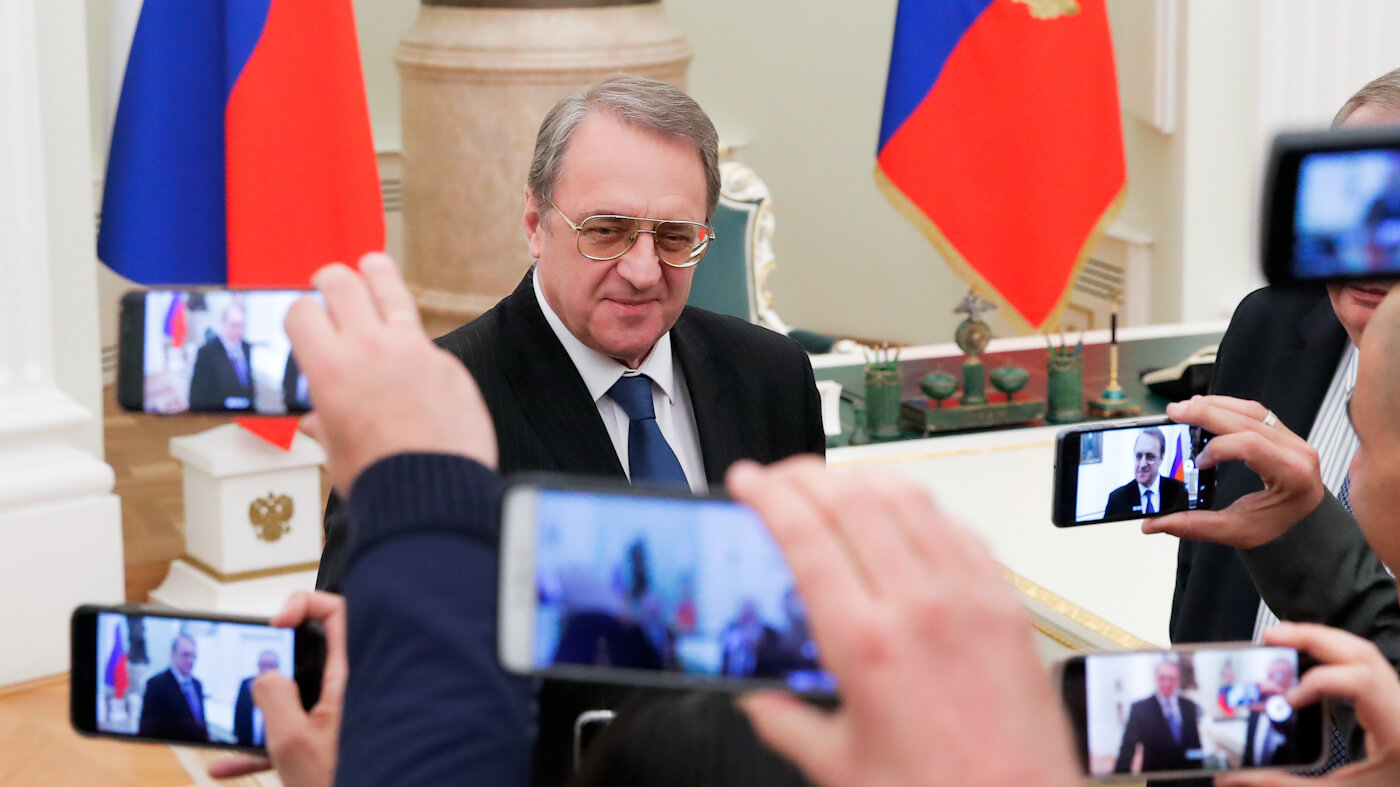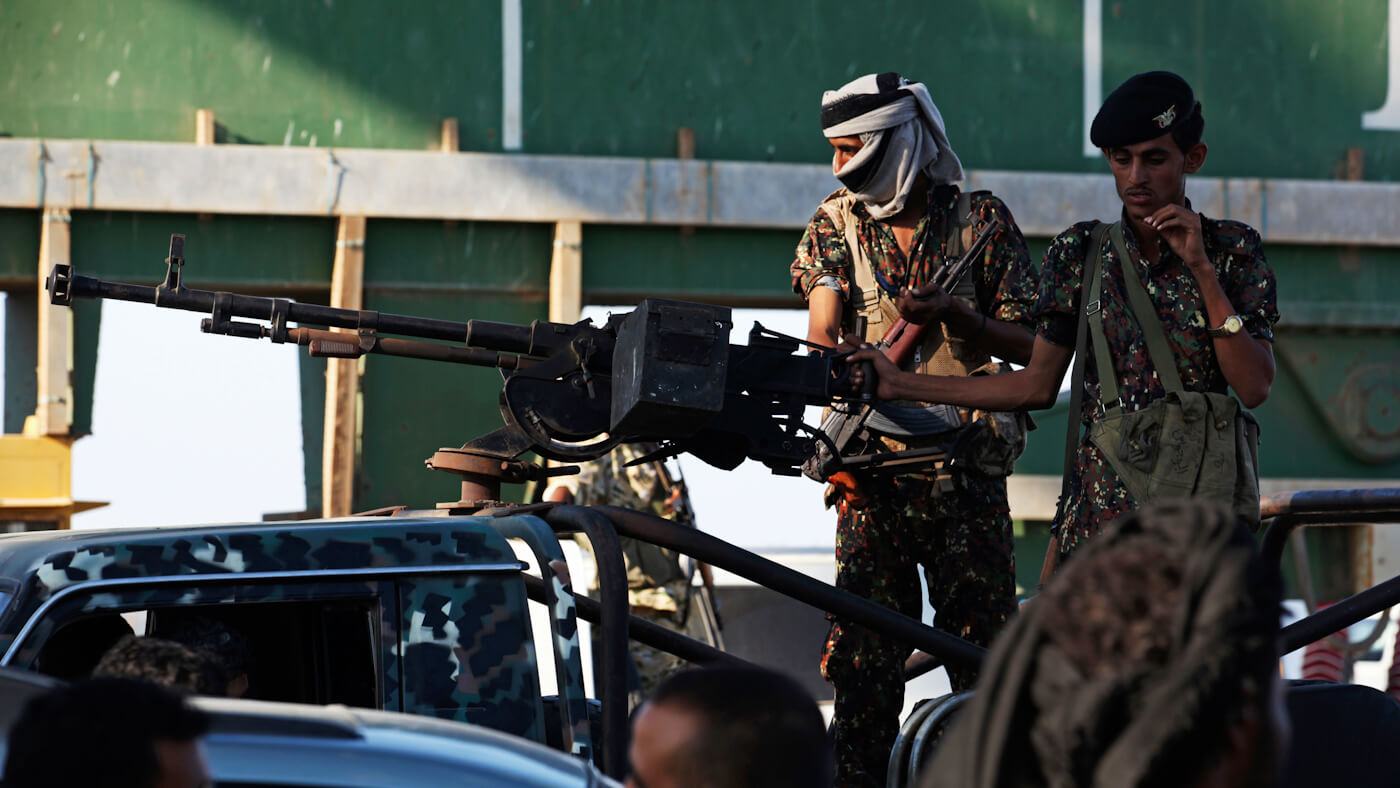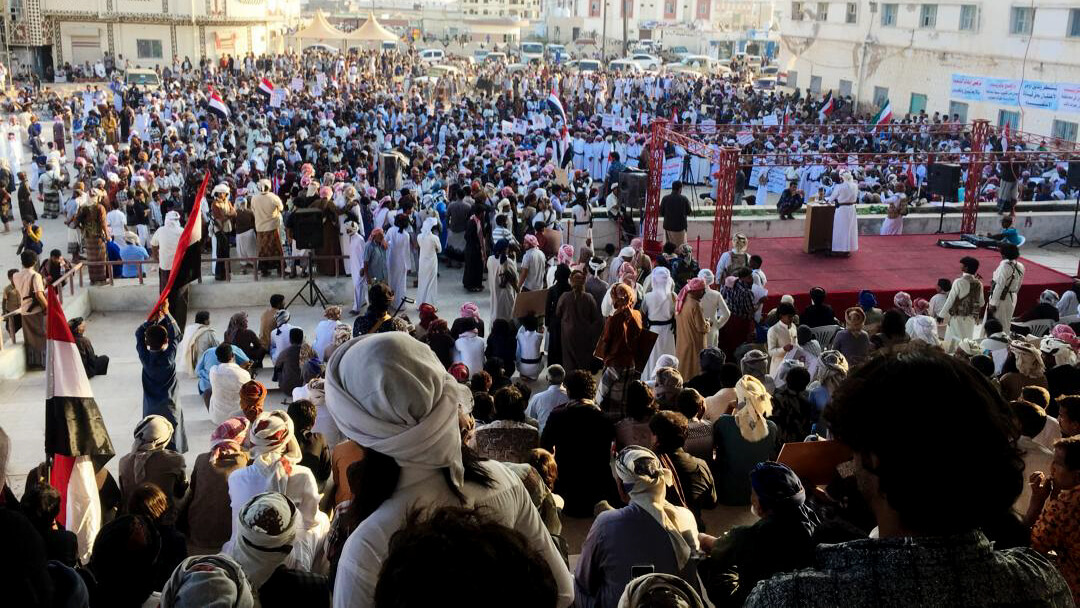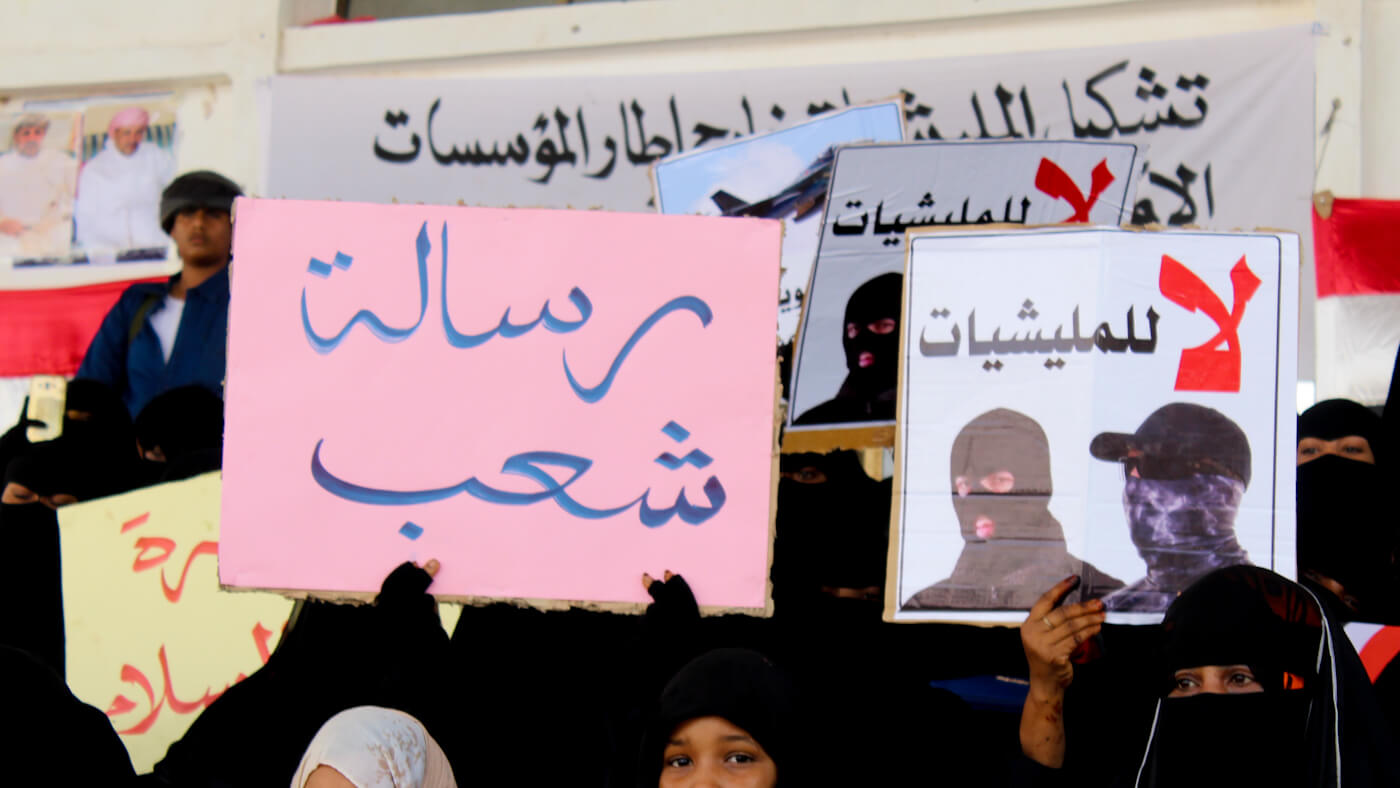Jemen
bukt voor het vijfde jaar onder aanvallen van de Saoedische
terreurcoalitie op niet alleen woonwijken, scholen, ziekenhuizen,
energiecentrales en watertoevoerbedrijven (allen ernstige oorlogsmisdaden volgens het Verdrag van Genève), maar ook aanvallen op
landbouwbedrijven....... Tussen maart 2015 en maart 2019 heeft deze
terreurcoalitie maar 'liefst' 10.000 aanvallen uitgevoerd op
landbouwbedrijven, 800 aanvallen op voedselmarkten en 450 aanvallen
op silo's en pakhuizen met voorraden voedsel...... Bij de aanvallen op landbouwbedrijven worden niet alleen de dieren vermoord en gebouwen vernietigd, maar ook de akkers zijn doel van bombardementen, waarbij men rotzooi gebruikt die de grond giftig maakt en dus onbruikbaar voor het verbouwen van gewassen......
Deze
terreurcoalitie,bestaat uit: Saoedi-Arabië, de Verenigde Arabische
Emiraten (VAE), Egypte, de VS en Groot-Brittannië, al zou ook Frankrijk
intussen middels wapenleveringen een bijdrage leveren aan de genocide
in Jemen (Nederland levert 'alleen wapenonderdelen' aan S-A....')...... Deze coalitie heeft er haar specialiteit van gemaakt
ook waterputten e.d. aan te vallen, zo werden er: 9.017 traditionele
irrigatie kanalen getroffen, minstens 1.834 waterpompen, 109
oppervlakte waterputten en artesische bronnen, 1.170 moderne
irrigatie netwerken, 33 op zonne-energie draaiende irrigatie
apparatuur...... Hoe bedoelt u, je kan niet stellen dat de Saoedische
terreurcoalitie bezig is met een genocide...?? Nog een paar cijfers:
940.400 boerderijen werden gebombardeerd en 359.944 bijenkorven
werden vernietigd.......
Intussen
moeten er rond de 500.000 mensen zijn omgekomen en niet enkele
tienduizenden zoals de reguliere westerse media aangeven, althans als
ze al aandacht aan deze genocide-oorlog schenken, wat men liever niet
doet, daar die media ofwel in handen zijn van de overheid (in
Nederland) dan wel in handen zijn van plutocraten en plorken die zich verenigd hebben in belastingontduikende investeringsmaatschappijen....... Figuren die geen kwaad
woord, of althans zo min mogelijk kwaad willen horen spreken over de
reli-fascistische terreurstaat Saoedi-Arabië en haar 'collega'
reli-fascistische staten in de regio, staten waaraan deze investeerders en plutocraten dik geld kunnen verdienen........
Bijna
2 jaar geleden wist men al dat zo'n 80.000 Jemenitische kinderen zijn
omgekomen door honger ,cholera en difterie, voorts behoren naast
kinderen, de zwakkeren, dus chronisch zieken en ouden van dagen tot
de slachtoffers.......
Zoals al
zo vaak op deze plek verzucht, hoe is het godverdomme allemaal
mogelijk?? Terwijl de westerse wereld na de genocide in Rwanda
plechtig beloofde dat iets dergelijk niet nog een zou
plaatsvinden.......
(Oh ja,
zou ik het bijna weer vergeten: ons koningshuis onderhoudt
vriendschappelijke banden met het psychopathisch moorddadige zootje
in Saoedi-Arabië dat zich daar koningshuis noemt....... Ja ja.......
Wellicht tijd voor W.A. en Maxima* om af te reizen naar Saoedi-Arabië
en het koningshuis daar te feliciteren met het verloop van de
genocide-oorlog....... )
Het
volgende artikel komt van MintPress News en werd geschreven door
Ahmed Abdulkareem
Five Years On, Saudi Attacks on Yemen’s Farmers Are Pushing the Whole Country into Famine
Between
March 2015 and March 2019, the Saudi-led Coalition launched at least
10,000 airstrikes in Yemen that struck farms, 800 that struck local
food markets, and about 450 airstrikes that hit silos and other food
storage facilities.
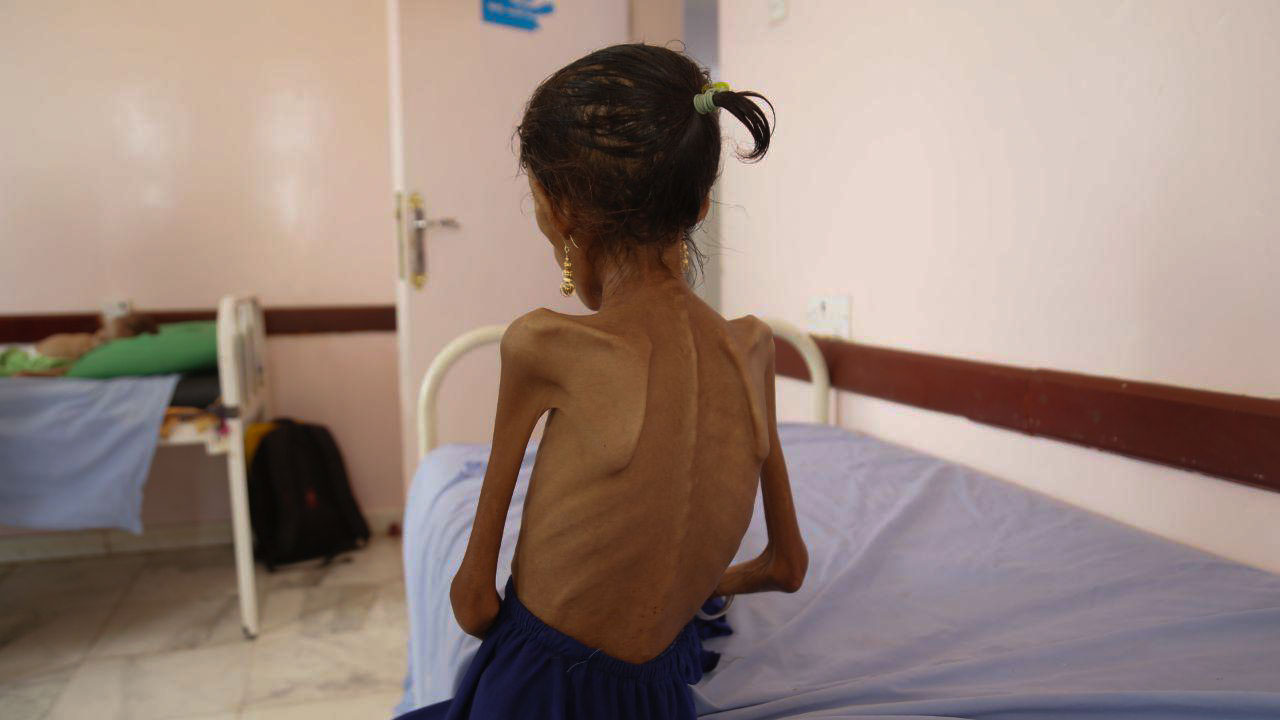
November
01st, 2019
HODEIDA, YEMEN — The country of Yemen, known in the medieval period as “Green Yemen,” is one of the most extensively terraced areas of the world. There, Yemeni farmers transformed rugged mountain slopes into terraces and built dams like the Great Marib, a structure whose history spans long enough that it was mentioned in the Quran. During the medieval period, Yemen had one of the widest ranges of agricultural crops in all of the Middle East.
Farhan
Mohammed is one of the richest farmers in Qama’el, a
rural village in the region of Baqim in northwestern Yemen. He owns
50 hectares of land which he uses to cultivate corn, pomegranates,
and apples. Now, Farhan is struggling to keep his farm afloat after
Saudi airstrikes targeted his fields, burning his crops and rendering
the soil so toxic that it’s no longer able to sustain life. Saudi
Arabia’s now nearly five-year-old project in Yemen has decimated
the incomes of Farhan and most other Yemeni farmers. Fuel is hard to
come by thanks to a Saudi-led coalition blockade and the fuel that is
available has become prohibitively expensive. Airstrikes targeting
farm fields and orchards have rendered large swaths of Yemen’s
arable land too toxic to use.
Almost
immediately after March 2015, when the war began, the Saudi-led
Coalition began targeting Yemen’s rural livelihood, bombing farms,
food systems, markets, water treatment facilities, transportation
infrastructure, and even agricultural extension offices. In urban
areas, fishing boats and food processing and storage facilities were
targeted.
Before
the war began, over 70 percent of Yemen’s population lived in
villages dispersed in the mountains and small towns with irregular,
and at times torrential, summer rainfall. These rural residents
relied on agriculture and animal husbandry and grew fruits and
vegetables to feed their own families and to sell to markets. Yet
that way of life has all but disappeared since the Saudi attacks
began, undermining rural livelihoods, disrupting local food
production, and forcing rural residents to flee to the city.
Now,
Yemen’s nationwide level of household food insecurity hovers at
over 70 percent. 50 percent of rural households and 20 percent of
urban households are now
food insecure.
Almost one-third of Yemenis do not have enough food to satisfy basic
nutritional needs. Underweight and stunted children have become a
regular sight, especially amongst the holdouts in rural areas.
Families that have fled to cities are often forced to beg or to pick
through the trash for food scraps.
According
to a
recent report by
the United Nations Development Program (UNDP), poverty in Yemen has
jumped from 47 percent of the population in 2014 to a projected 75
percent by the end of 2019 because of the war. The report warned, “If
fighting continues through 2022, Yemen will rank the poorest country
in the world, with 79 percent of the population living under the
poverty line and 65 percent classified as extremely poor.”
The intentional targeting of agriculture
The intentional targeting of agriculture
The
targeting of the Yemeni agriculture sector and rural livelihoods is
not merely accidental collateral damage incurred while targeting
military sites. Data from the country’s Ministry of Agriculture
shows that in the period between March 2015 and March 2019, the
Saudi-led Coalition launched at least 10,000 airstrikes that struck
farms, 800 that struck local food markets, and about 450 airstrikes
that hit silos and other food storage facilities in the country.

A man looks at cows killed in a Saudi airstrike on a dairy farm in Bajil, Yemen, January 2, 2016. Abduljabbar Zeyad | Reuters
According to the Ministry, crop-area cultivation declined an average of 40 percent and crop yields by 45 percent in rural areas. Many farmers in these areas reported that they could no longer produce yields at pre-war levels due to the extensive damage to infrastructure, the high cost of diesel fuel and other agricultural inputs, a collapse in markets and the destruction of roads and storage facilities.
According to a field survey carried out by the Ministry of Agriculture in the period between March 2015 and March 2018, Saudi attacks completely destroyed 270 agricultural buildings and facilities, 43 agricultural associations, 9,017 traditional irrigation canals, 54 agricultural markets, and 45 export centers.
High precision U.S. bombs dropped by Saudi-led coalition warplanes destroyed at least 1,834 irrigation pumps, 109 artesian and surface wells, 1,170 modern irrigation networks, 33 solar irrigation units, 12 diggers, 750 pieces of agricultural equipment, 940,400 farms, 7,531 agricultural reserves, 30 productive nurseries, 182 poultry farms, and 359,944 beehives.
Yemen has no major rivers like the Euphrates in Iraq and Syria or the Nile River, which supplies water to farmers in a number of African countries. This leaves farmers reliant on irrigation canals that channel rain and floodwaters into weirs and bunds built by local communities that are vulnerable to Saudi attacks. Attacks that have already completely destroyed at least 45 water installations (dams, barriers, reservoirs) and partially destroyed at least 488, including the ancient Marib Dam.
Yemen’s fishing sector has not been spared either. By the end of May 2019, every fish off-loading port in Yemen had been targeted by Saudi attacks. At least 220 fishing boats have been destroyed, 222 fishermen have been killed and 40,000 fishermen lost their only source of income. According to Yemen’s Ministry of Fishing Wealth, this has affected the lives of more than two million people living in coastal cities and villages.
Data shows that Saudi Coalition forces have stopped at least 4,586 fishing boats from leaving port in the directorates of Midi, Hajjah, Dabab, Bab al-Mandab, and in the Mukha districts in the Taiz governorate. Thirty fishing industry companies have left the country and about fifty fish factories have closed, causing catastrophic damage to Yemen’s fishing industry. Even before the war, Yemen’s fishermen were amongst the poorest segments of society.
As the war nears its fifth year, the Saudi-led coalition has continued to target the livelihoods of Yemen’s food producers. The coalition has expanded its military offensive to include large areas of agricultural lands and valleys in the K16, Durahami, Al-Jah, A-Tahita, Al-Faza, Jabaliya, Al-Mughrous, Al-Khokha and Hays countrysides.
Yemen’s breadbasket withers
With family in tow, Haddi Ibrahim Koba fled his family home in Al-Shaab in northwestern Tihama months ago after Saudi airstrikes destroyed his farm. The Koba family now struggles to eke out an existence 60 km away in the populous Hajjah province. Once proudly self-sufficient, relying on animal husbandry and farming for their livelihood, they now depend on handouts from humanitarian organizations, the meager bodies of their children already show signs of malnutrition.
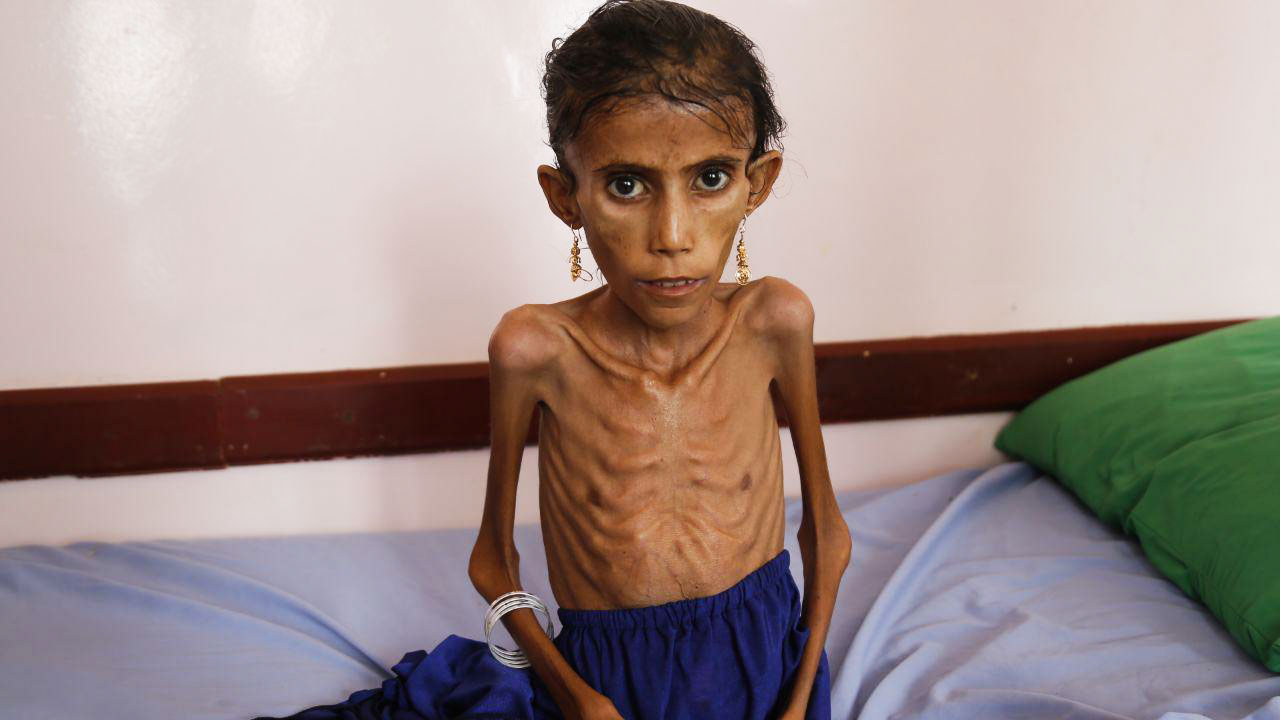
13-year-old Fatima Haddi Ibrahim Koba is pictured in a Hajjah hospital, October, 28, 2019. Riadh al Hussam | MintPress News
According to a study by the Sana’a University-based Water & Environment Centre (WEC) in collaboration with the Flood-Based Livelihoods Network issued in November 2017 to assess the impact of the current war on food security in Yemen, the war is already drastically aggravating Yemenis’ ability to earn a livelihood, rapidly deteriorating the availability of food and elevating the complexity of an already dire humanitarian crisis in the country.
The study, The War Impact on Food Security in the Tihama, (Tihama is a region of Yemen traditionally known to be the country’s breadbasket) showed how agriculture in Tihama, which sustains most of the country’s population, has been seriously disrupted by the war. This, the study’s authors say, is undermining the productivity and investment capacity of the entire country.
Wadi Zabid is one of Tihama’s main valleys located in the Houthi stronghold of Hodeida, the second-largest governorate in Yemen. It is the second-largest valley in Tihama, with an area of 4,639 square kilometers. Before the war, Wadi Zabid was a model of sustainable agriculture and food security, but as of June 2017, when the WEC study was released, 43 percent of the valley’s residents were going hungry every night. Land cultivation has decreased by 51 percent and crop yields per hectare have declined between up to 61 percent. The production of fruits and vegetables has been wiped out as has the livestock population. Today, conditions for farmers in Tihama are likely even more dire than they were when the study was released.
Tihama’s woes are not due to climate change or local mismanagement. Instead, they are a direct result of the destruction of irrigation and water infrastructure resulting from Saudi attacks on the valley’s diversion dams and irrigation systems. Water in the irrigation canals in the downstream villages of both of Tihama’s main valley’s has decreased by about 60 percent since the war began, according to the study.
That damage has also created a massive impact on upstream areas that rely heavily on floodwater irrigation and has damaged irrigation systems and diversion dams affecting up to 75 percent of Tihama’s households.
Creating a toxic legacy
The Saudi-led coalition’s blockade on Yemen’s ports, airports and borders has only exacerbated the suffering of the country’s farmers and rural residents. The coalition has prevented the export of their products, especially to wealthy Gulf countries which imported thousands of tons of pomegranates and vegetables from Yemen before the war began. Importing pesticides, agricultural fertilizers and fuel has also become difficult due to the frequent seizure of seafaring vessels by the coalition.
For 77 days, the coalition, led by Saudi Arabia and the United Arab Emirates, has continued to hold ships loaded with oil derivatives at sea, preventing them from entering the port of Hodeida. The four ships that were allowed in carried transport fuel, not the fuel needed to power generators on which farmers rely.
Like in Tahamah, the blockade and attacks on agricultural targets across Yemen have not only destroyed machinery and infrastructure, it has had acute ecological impacts that may take decades to reverse. The accumulation of sediment in flood channels due to damaged gates and automatic barriers has caused trees to begin to reclaim now-dormant stream beds and flood plains, hampering the arrival of much-needed floodwaters to agricultural fields.
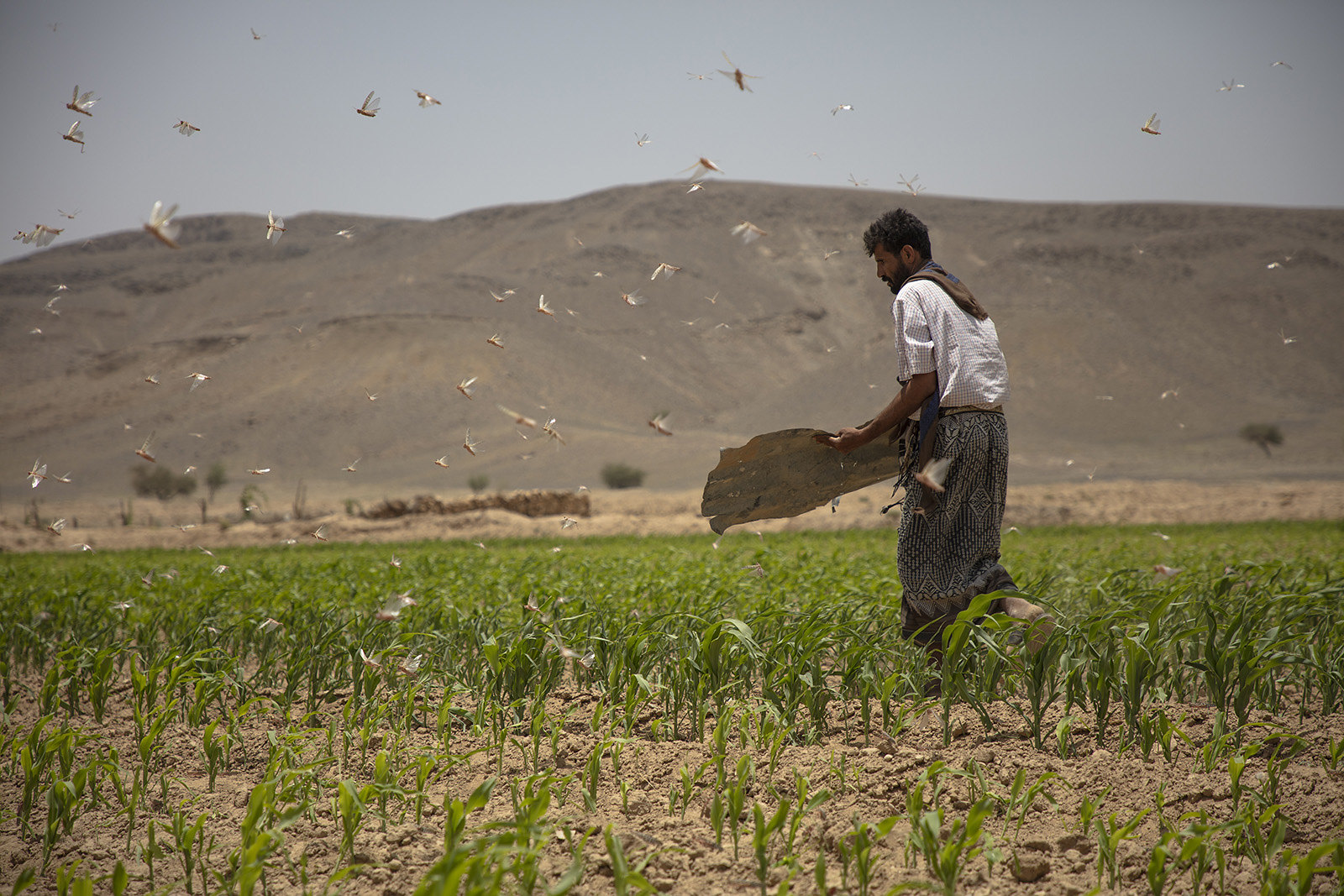
A Yemeni farmer tries to chase locusts off of his fields. Photo | UNFAO
Fertile
soil, especially in the border areas in Saada and Hajjah, has become
environmentally polluted due to the number of weapons dropped in more
than half a million airstrikes. That pollution has not only affected
the soil, experts fear it could genetically alter the pomegranates,
grapes and coffee that were once staple crops in Yemen. Farmers and
their families are at constant risk from unexploded ordnances,
especially cluster bombs like the one that killed
a young boy on
his family farm in Hodeida last Thursday.
Agricultural and environmental experts that spoke to MintPress said that the effects of the Saudi coalition’s targeting of the agricultural sector will likely last for decades. The Director of Agricultural Extension in Yemen, Salah al-Mashreqi, said that more catastrophic effects will appear in the medium and long term, including genetic changes to pomegranates, for which Yemen is famous.
The deliberate targeting of food is prohibited by article 54 of the Geneva Conventions and the May 24, 2018, UN Security Council resolution 2417 on the protection of civilians in wartime, specifically reiterates this principle. Article 14 of the 1977 Protocol Additional to the Geneva Conventions clearly states that starvation as a means of combat is not allowed: ‘’It is prohibited to attack, destroy, remove, or render useless objects indispensable for the survival of the civilian population.” Yet the international community has done little to curb the Saudi-led coalitions use of starvation as a tactic of war in Yemen.
This, in large part, according to many Yemenis and legal scholars alike, is because Saudi Arabia enjoys the near-total diplomatic protection of the United States. Without that support, Saudi Arabia’s airstrikes, which rely on American contractors, targeting software, training, weapons, and technicians to target farmers that are concerned with little more than feeding themselves and their country, would not be possible.
Feature photo | 13-year-old Fatima Haddi Ibrahim Koba is pictured in a Hajjah hospital. The Koba family had to flee their farm in Tihama after it was attacked by the Saudi-led coalition, October 28, 2019. Riadh al Hussam | MintPress News
Ahmed AbdulKareem is a Yemeni journalist. He covers the war in Yemen for MintPress News as well as local Yemeni media.
Republish our stories! MintPress News is licensed under a Creative Commons Attribution-NonCommercial-ShareAlike 3.0 International License.
=========================================
* Zie o.a.: 'Maxima overlegt met de Saoedische massamoordenaar MSB' (nadat W.A. en ik dacht PvdA plork Koenders een paar jaar eerder de begrafenis van de oude dictator koning bezochten)
Zie ook:
'Saoedische piloot schoot 3 matrozen dood >> de reden daarvoor ligt in de stationering van VS militairen in S-A'
'Genocide Jemen: 5 jaar lang met opzet landbouwbedrijven bombarderen door Saoedi-Arabië drijft het volk richting hongerdood'
'Irak gevangen door VS agressie richting Iran en daarnaast een opstand in eigen land'
'VS stuurt 3.000 militairen en rond de 36 straaljagers naar Saoedi-Arabië voor een aanval op Iran'
'Jemen: Houthi's behaalden een grote overwinning op het Saoedische leger'
'Jamal Khashoggi één jaar geleden vermoord door Saoedi-Arabië, geen sancties en geen sluitingen van ambassades'
´Saoediërs bombarderen Jemen na aanbod Houthi's tot wapenstilstand´
'Duitsland, Frankrijk en Groot-Brittannië: Iran is de dader, er is geen andere plausibele verklaring voor de aanval op Saoedische olie-installaties '
'Iran dreigt met volledige oorlog bij vergeldingsaanval voor aanslag op Saoedische olie-installaties'
'Iran klaar voor oorlog tegen de VS'
'Duitsland, Frankrijk en Groot-Brittannië: Iran is de dader, er is geen andere plausibele verklaring voor de aanval op Saoedische olie-installaties '
'Iran dreigt met volledige oorlog bij vergeldingsaanval voor aanslag op Saoedische olie-installaties'
'Iran klaar voor oorlog tegen de VS'
'Houthi aanval op Saoedische raffinaderijen: een grote blunder van de VS'
'‘Maximum lies’: Iran rejects US’ claim it attacked Saudi oil facilities, warns it’s ready for war
'‘Maximum lies’: Iran rejects US’ claim it attacked Saudi oil facilities, warns it’s ready for war
'Groot-Brittannië verkocht na de moord op Khashoggi wapens ter waarde van 810 miljoen dollar aan S-A'
'VN stuurt bedorven voedsel naar Jemen en beschuldigt de Houthi's van het tegenhouden van voedselhulp'

